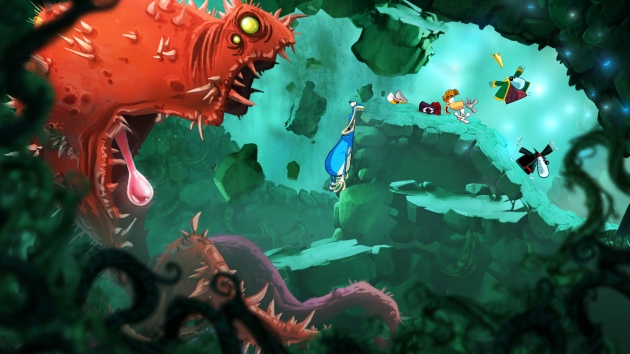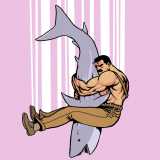Game of the year 2011, part 2: Numbers 10-6
By MSG 1 Comments
10. To The Moon -- Freebird Games

 I was very hesitant to include Kan Gao and Freebird Games’ PC adventure, To The Moon, on this list. After all, these are supposed to be my 10 favorite games of 2011.
I was very hesitant to include Kan Gao and Freebird Games’ PC adventure, To The Moon, on this list. After all, these are supposed to be my 10 favorite games of 2011.
To The Moon hardly has any play in it at all. The little it does is dull and repetitive. After finishing it and allowing myself some time to think about the experience, I quickly settled on the opinion it’s a wonderful story, but a bad game. This story could have been told just as effectively in a book or film or TV show. How dare it not take advantage of its medium?
But I was wrong. As the always-insightful Michael Abbott writes, “games aren’t clocks.” They’re not defined by their ability to do one thing well. Video games are multifaceted expressive works, telling stories and resonating with us through more than just play, but also what we see and hear.
It’s not important then that To The Moon’s play segments are little more than pixel hunts and god-awful flipping-tile puzzles. What is important is that Kan Gao has written a beautiful story that had me on the verge of tears on more than one occasion.
To The Moon isn’t so much about experiencing a life in reverse, as it is experiencing a relationship from its heartbreaking end to its innocent beginnings. You’re witness to this couple’s life, love and dreams, but you know how it all ends. It’s a snowball of tragedy, with an emotional resonance that grows as everything unfolds.
The true star is the script. Gao builds likable characters with real, tangible arcs. The old man at the heart of the narrative provides both a compelling a mystery and emotional center. Why is it his dream to go to the moon? What happened to his wife?
The scientists out to make his deathbed wish come true are just as well realized. They toss around truly funny banter and [gasp] grow as people in the end.
It’s no surprise that one of the year’s best game narratives isn’t concerned with saving the world or finding a magic thingy. It’s a personal story about things we can all relate to: love; loss; mortality; memory. I’ve never experienced anything quite like it in a game and regardless of how it actually plays, it’s an intensely moving trip worth celebrating.
You can purchase To The Moon directly from Freebird right here
9. Catherine -- Atlus Persona Team

Adulthood is one of gaming’s greatest taboos. Sure, a lot of games purport to be “mature,” but most fail to deliver subject matter that would challenge even a 10 year-old.
That’s where Atlus’ Catherine comes in. The anime inspired tale explores real problems and moral questions regarding relationships, infidelity, marriage and fatherhood.
Beyond the no frills depictions of sex, drinking and the dread of growing up, Catherine is a challenging and miraculously thrilling puzzle-action game.
The puzzles are constantly evolving, with new types of blocks and challenges being added with each new stage. Even better, our protagonist, Vincent, is often being chased by some sort of monster (each reflecting one of his real world woes, of course). It creates that very special kind of tension. You know, the one where your hands are shaking and you start talking to the TV.
There’s not much more to say about Catherine. It’s a strange and thought-provoking game – worthwhile commentary wrapped around a great puzzle game. At a point its weirdness and supernatural elements start to wear away at the story it’s trying to tell, but we need to give respect where respect is due. I was enthralled by Catherine from start to finish, lusting over its puzzles while I wasn't playing and trying to figure out just where the story was going next.
8. Shadows of the Damned -- Grasshopper Manufacture

Remarkably, Shadows of the Damned, the product of three Japanese game development superstars -- Suda 51, Shinji Mikami and Akira Yamaoka – feels like the cohesive vision of one crazy individual.
The bloody art, perverse writing, sometimes terrifying music and tense shooting all meld together to create a strange new vision of hell: baby heads guard doors only to be satiated by eyeballs or strawberries; demon-goat-redneck merchants eat your gems and spew up merchandise; tiny cyclopse monsters take flaming dumps to mark checkpoints.
Things get very nerve-wracking very quickly as you’re thrown into a multitasking combat scenario with Yamaoka’s wailing, demon chorus blaring at you in the background.
But it’s not all serious. Actually, most of the game is pretty freaking dumb, but in an endearing way. Protagonist Garcia Hotspur and his floating skull sidekick Johnson are the year’s best new duo, slinging more dick jokes than a Judd Apatow movie. The supporting cast is also memorable, particularly the bosses who are given darkly comic backstories in the form of picture books that our heroes hilariously narrate.
The problem with horror-shooters such as Dead Space is that the feelings they strive for – unnerving, shaky handed tension – can usually only last for so long before the player is just spent. Shadows cuts through that with comedy. It’s a brief respite, but enough to remind you that this hell isn’t so bad. After all, any place where liquor restores health can’t be all bad, right?
Head here for my full review
7. Superbrothers: Sword and Sworcery EP -- Capybara Games

The argument against mobile games is that they’re often too mindless: not much more than single button high-score hunts or laborious time wasters. While this is of course a generality, most of my favorite mobile games could be simplified to fit into one of those two categories.
But not Sword & Sworcery. The audiovisual collaboration from Capybara Games, design outfit Superbrothers and singer-songwriter Jim Guthrie is a mesmerizing experience that, while not legitimizing mobile touch-based games (because they don’t need to be), is a stellar argument for the power they can hold.
The combat and point-and-click adventure mechanics are built perfectly for the iPad. Simple taps and gestures allow you to navigate and interact with the world, but it’s the surprising ways they’re experimented with that really propel S&S.
It’s littered with moments that task you with throwing out what you think the game wants. We infer from the very beginning that interactions should be limited to one finger, but the game never gives us that rule. It then subverts that inference and forces you to realize you’ll need two fingers to pull apart a giant pixel-art tree.
Finding that puzzle’s solution is rewarding, but even better is the feeling of manipulating these gorgeous and detailed environments. Capy leveraged the unique features of their platform – the tangible feeling of interaction and closeness provided by a multitouch-screen – to draw the player in and then capitalizes on it with visuals and sound that come together to give this strange world a very real personality.
Much of the credit has to go to the sound design and soundtrack. It effortlessly shifts from spacey to lilting to menacing. One sound from one track – the cooing of “The Ballad of the Space Babies” -- is enough to flood me with a warming comfort whenever I hear it. In or out of game.
Sword & Sworcery is an endlessly clever use of modern technology, pooling together all the features of Apple’s iOS platform to create a magical sensory and social experience. It at times blocks its own path to genius, stopping the player from proceeding without jumping through a few tedious hoops, but when the pieces are moving together, it’s a stunning experience.
Purchase Sword and Sworcery here
6. Rayman Origins -- Ubisoft Montpellier

“Pixar-quality graphics.”
We’ve heard that phrase a thousand times, thrown around by hardware manufacturers touting the power of new consoles or video cards. We’re obviously not there, and the phrase itself has become is a cliché of dropping-to-your-knees-and-screaming-at-the-heavens proportions.
Rayman Origins offers a spectacular argument against this sort of techno-musclehead pomposity. Instead of striving for the heights of Pixar-quality, Michel Ancel and his team created classic Disney-quality graphics: detailed hand-drawn art that’s full of life and dripping with charm.
There is a specific kind of goofy, thoughtful whimsy that just bleeds from every frame. This is thanks in part to the gorgeous visuals of course, but just about every aspect of the game comes together to help deliver this joyful cartoon experience.
There’s the little things: the noises Rayman makes when he’s defeated and turned into a bubble; the faces each character makes when slapped by a partner; the often comically stilted animation; the Alvin and the Chipmunk-esque theme that throws fairy-like Lums into a dancing fit. They’re all enough to put a smile on my face.
It’s also a thrilling 2D platformer that at times reaches Super Meat Boy levels of speed and devilish difficulty.
The glue that holds everything together is the soundtrack. It marries a gleeful orchestral score fit for any classic cartoon with a menagerie of strange instruments: didgeridoos; mouth harps; kazoos. The opening ukulele strums of the forever imprinted on my brain “The Lum King” contain more personality alone than the entirety of most modern scores. The music glides between styles to fit in with the various worlds: slinky, lounge jazz for the synchronized swimming lums of the Sea of Serendipity; mariachi for the fiery, culinary hell of Gourmand Land; manic, flamenco kazoos to accompany the mosquito shooter stages.
The end product is pure glee. It deftly toes the line of saccharinity, deploying oddball and slapstick humor to dial things back. Rayman Origins is a lesson for the entire video game industry; a magnificent display of pure personality and creativity

1 Comments